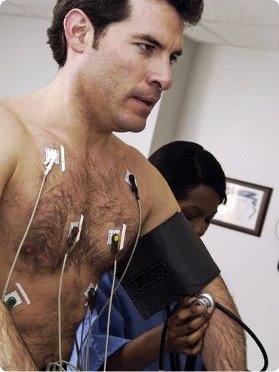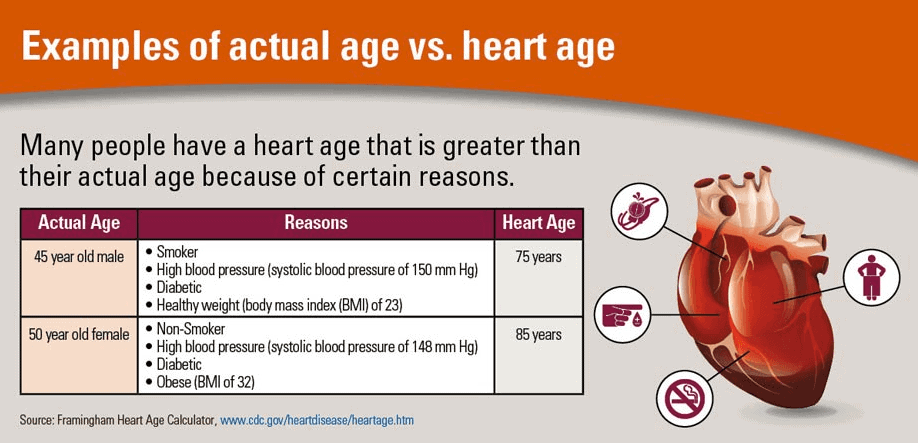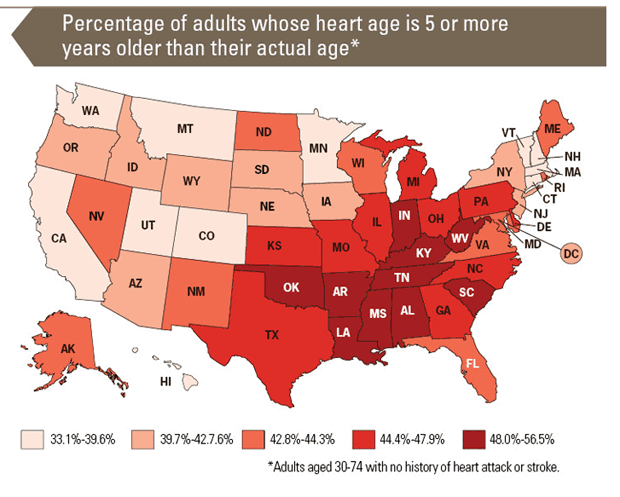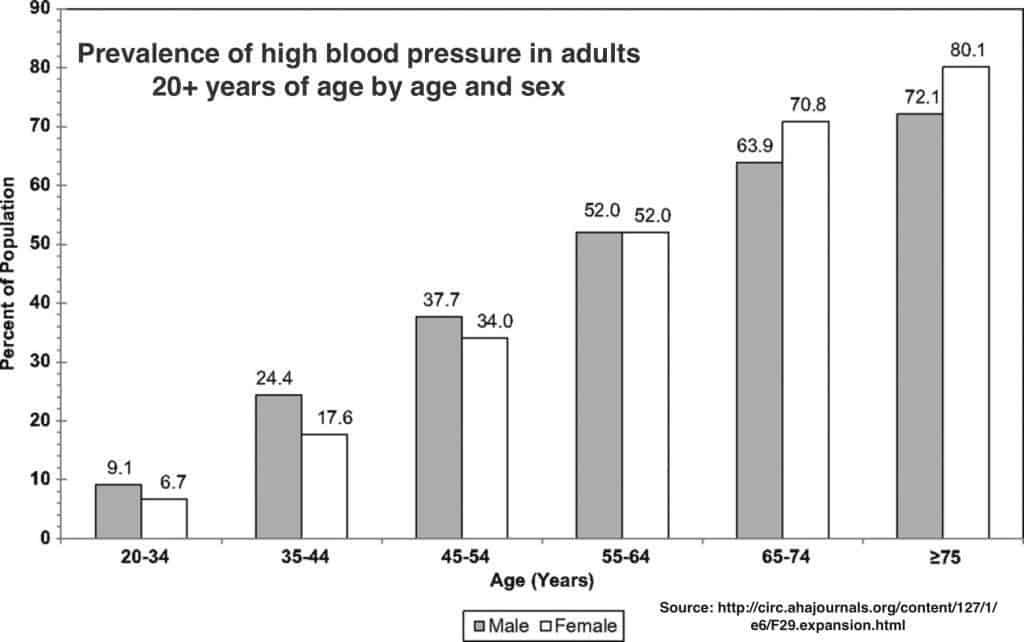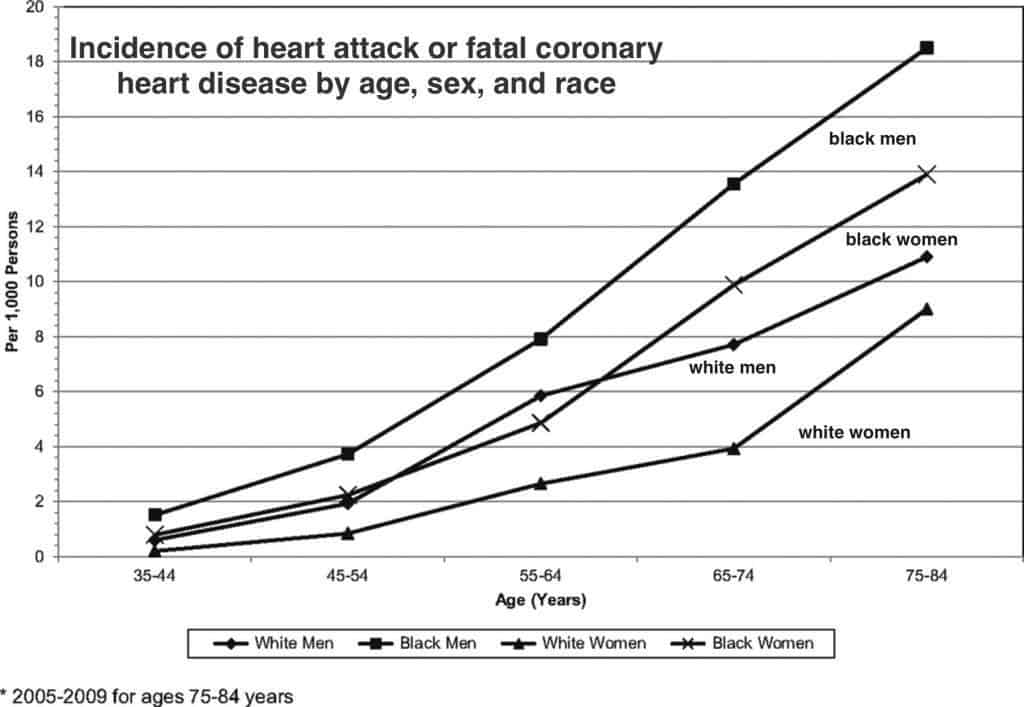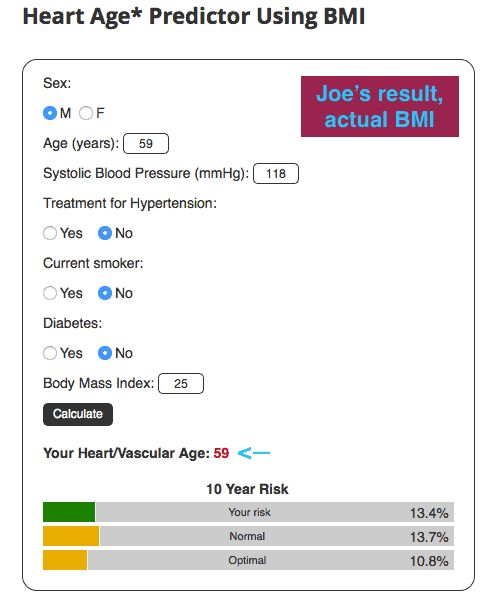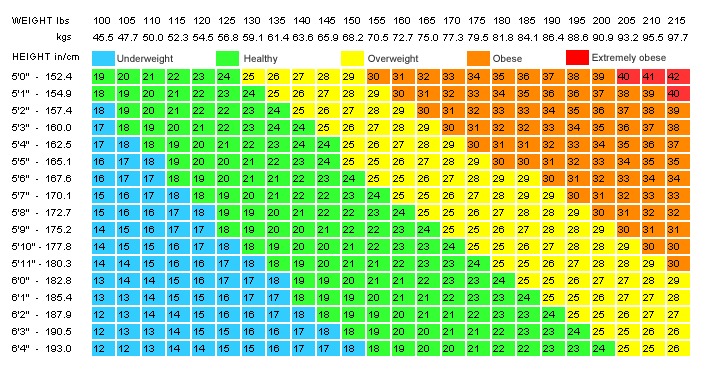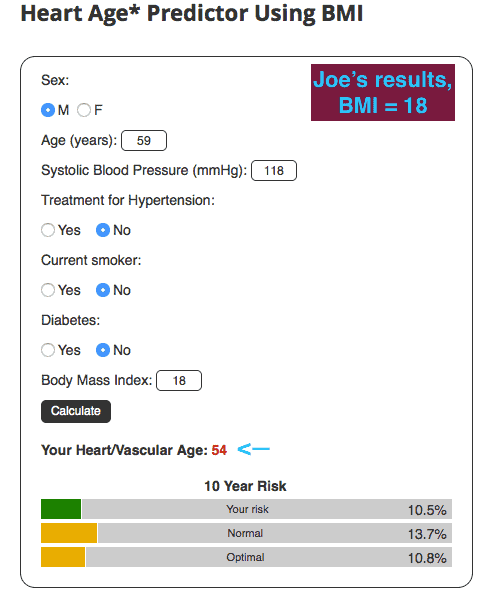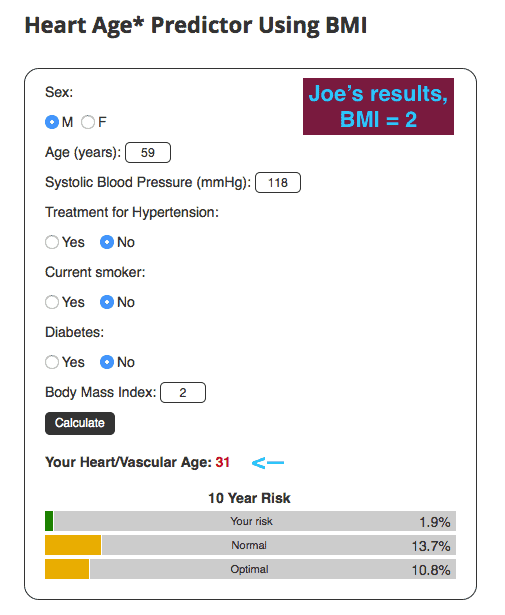Why Your Heart Is Older Than You
75% of Americans’ heart age is older than they are. Odds are, then, that your heart is functionally older than are you. Take the test and found out.
Well, it’s a challenge if you think your fitness level is pretty darn good.
You spring from bed early each morning eager to knock down the dominoes erected the night before. No task will go unfinished. You have the necessary energy. You’re in shape.
If that’s your perception, may it be true. But for 75% of any American reading this, one very important organ that’s the hallmark of health is older than you are.
That organ is your heart.
As reported by various news organizations, such as this one by CBS News, officials from the Centers for Disease Control and Prevention (“CDC”) released a study on September 2, 2015, which estimates that 3 out of 4 adults in the United States have a predicted “heart age” older than their chronological age.
Check out this chart from the CDC’s Vital Signs:
Sobering!
Can you imagine being a man just 45 years old with a heart that functions like a 75 year-old’s, or a 50 year-old woman with the heart of an 85 year-old?
There’s a way for you to get a clue about your own heart age. Your discovery begins with a few data points.
A person’s heart age is determined by taking into account:
- Actual age;
- Body mass index; and
- Risk factors, such as high blood pressure, cigarette smoking and high blood sugar.
The CDC study collected data from all 50 states and information from one of the largest, ongoing heart studies in the world, the Farmingdale Heart Study, and discovered:
- About 69 million U.S. adults between the ages of 30 and 74 have a heart age older than their actual age.
- Half of men and 2 in 5 women have a heart age that’s five or more years older than their chronological age.
- The average cardiovascular age for adult men was eight years older than their actual age, whereas it was five years older for women.
Where you live also is predictive.
The highest heart ages were typically in the South:
- Mississippi
- West Virginia
- Kentucky
- Louisiana
- Alabama
The lowest heart ages where here:
- Utah
- Colorado
- California
- Hawaii
- Massachusetts
This map tells the tale:
It’s no surprise that high blood pressure is an important predictor of heart health, and thereby, heart age. Check out how high blood pressure corresponds with age in this chart:
And when you combine all the other risk factors into the mix, the prevalence of cardiovascular incidences sharply increase as we age:
So, what should be stirring in your mind right about now is that you need to make specific lifestyle choices — particularly as they relate to blood sugar, blood pressure, body composition (like being very overweight) and cigarette smoking — that are complimentary to good heart health.
Because without your ticker, you stop ticking.
Test Your Heart Age
OK, by now you really want to know if your heart age exceeds your real age, don’t you?
You can find out your own cardiovascular age by using this online calculator. And if you don’t like the results of that one, try the HeartAge Test.
After you’re demoralized, limp back here, because I want to point out a flaw in the tests, as well as some youthful remedies to revitalize your ancient heart.
What’s Wrong With BMI
The first heart age test that I linked to above looks like the image below; this one being my actual result:
The problem with this test is how it calculates, in effect, the healthiness of your weight. Like most tests of this kind, it uses BMI, or Body Mass Index. As I wrote extensively about in Just Exactly How Fat Are You Anyway:
“If you’re particularly short, or tall or muscular, or an athlete… then the BMI results for you are phooey. BMI simply does not account for non-average muscle size, density or frame size.”
Here’s a typical BMI Chart:
Let’s look what the BMI calculation says about me…
I’m 6’4” tall and weigh 208 pounds. The BMI says that my score of “25” makes me “overweight” because it presumes that the extra weight I carry is comprised of fat; however, much of it is really muscle (I hope).
As you noted in my heart test results above, my BMI of 25 overwhelms the other risk factors, which for me are quite low, such as good systolic blood pressure (118), no smoking, no hypertension and no diabetes. The result is a heart age prediction equal to my chronological age. That’s not so bad, really, given that the majority of people have hearts that are older than the rest of their bodies — but it’s inaccurate.
If I used a BMI of 18, my heart age declines to 54, and strangely, if I used a number that should make me dead, a BMI of 2, my heart age is predicted to be 31.
I think if I were dead, my heart age would be irrelevant. Just a guess.
While I’d love to have a heart aged nearly thirty years younger than my chronological age, I think the trade off of being less than 100 pounds is untenable. (BMI of 12 is 100 pounds for my height.)
Now, before you throw the baby out with the bathwater because you don’t like what either of the two tests said about the age of your heart, recognize that the BMI calculation is pretty accurate for most people, which is why it’s extensively used.
Again, unless you’re unusually tall, sort, big boned (that doesn’t mean fat) or muscular, don’t scapegoat BMI, even thought that’s precisely what I’m doing.
Different ways to test your body fat
How To Make Your Heart Younger
You can make your heart younger, thereby reducing the risk of heart attack and stroke, not to mention being able to leap up those stairs two at a time. But it’s not easy, because the reason most of us have old hearts is due to lifestyle habits that are so firmly entrenched that it might take an excavator to dislodge.
“Lifestyle habits” refer to all the various things we do that impact heart health, such as what and how much we eat, how and how much we move, and an assortment of bad habits, such as inhaling smoke and drinking soda.
The Unhappy Truth About Soda (Video)
If you’re unhappy with your heart age test results, examine what you’re doing or not doing that may be the cause of it.
Dr. Tara Narula, a cardiologist at Lenox Hill Hospital in New York said this:
The heart age calculator is useful because it makes it easier for people to focus on the factors they need to change. You can see very clearly the significant difference you can make by changing those risk factors, like quitting smoking or losing weight.
Here’s what you can do right now to begin to make your heart younger:
- If you have high blood sugar, read my article about four tricks and four supplements that can dramatically help.
- If you need to move (aka exercise), begin with my article and videos on mobility, or read Get Functionally Fit Forever With These Six Bodyweight Exercises.
- If you have high blood pressure, read my post on meditation, a sure-fired way to reduce blood pressure and stress.
- If you smoke and can’t stop on your own, ask your doctor about some new drugs that are very effective.
- If you’re addicted to soda, replace it with carbonated water, lemon juice a touch of cayenne pepper and stevia, or some other wholesome sweetener.
Your Takeaway
Remember these four things:
- Despite how healthy you may think you are, it’s likely, says the CDC, that your heart is aging faster than you.
- You really do need a healthy heart to live a long and strong life.
- High body fat, high blood pressure, high blood sugar and hypertension are all significant risk factors for accelerating your heart age and decreasing its functional capacity.
- Either heart test (this one or that one) can give you sufficient information about your heart age to determine whether or not you should see a cardiologist and/or begin to adopt lifestyle habits conducive to heart health, such as reversing the risk factors listed in #3 above.
I’ll leave you with a quote by Barbara A. Bowman, Ph.D., director of CDC’s Division for Heart Disease and Stroke Prevention, who said:
Because so many U.S. adults don’t understand their cardiovascular disease risk, they are missing out on early opportunities to prevent future heart attacks or strokes. About three in four heart attacks and strokes are due to risk factors that increase heart age, so it’s important to continue focusing on efforts to improve heart health and increase access to early and affordable detection and treatment resources nationwide.
Ciao for now.
P.S. I encourage the courageous of you who take the test to submit your heart age and chronological age in the Comments below. Be sure to tell us which test you took and if you think your results are accurate, and why.
Click here for the Framingham test.
Click here for the HeartAge test.
Last Updated on February 27, 2022 by Joe Garma

